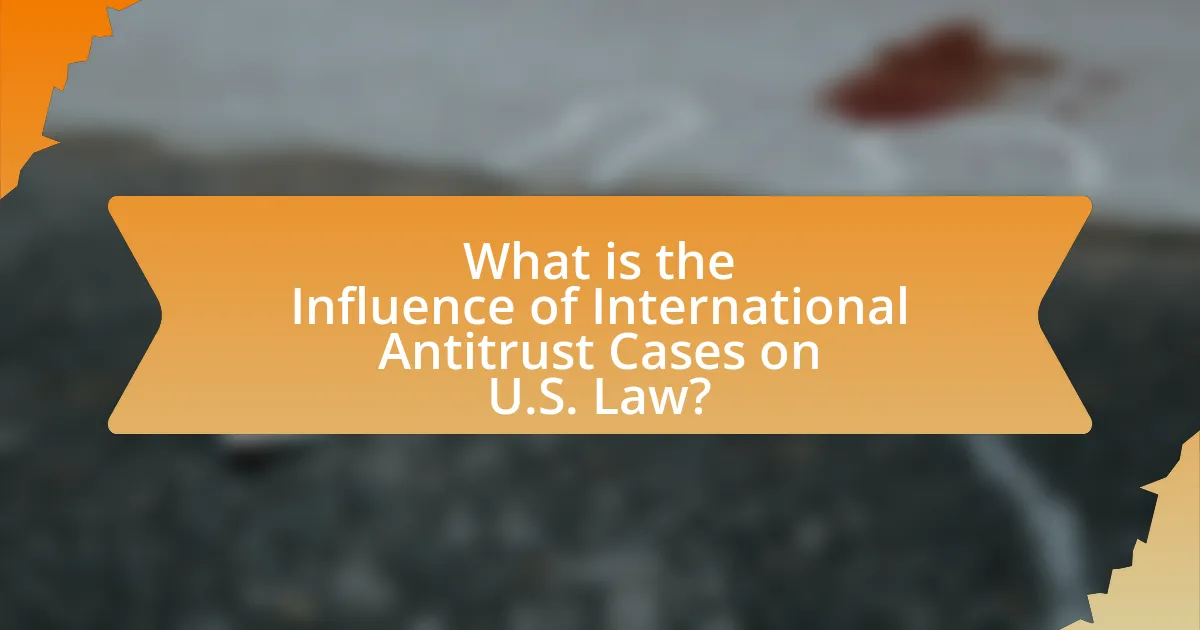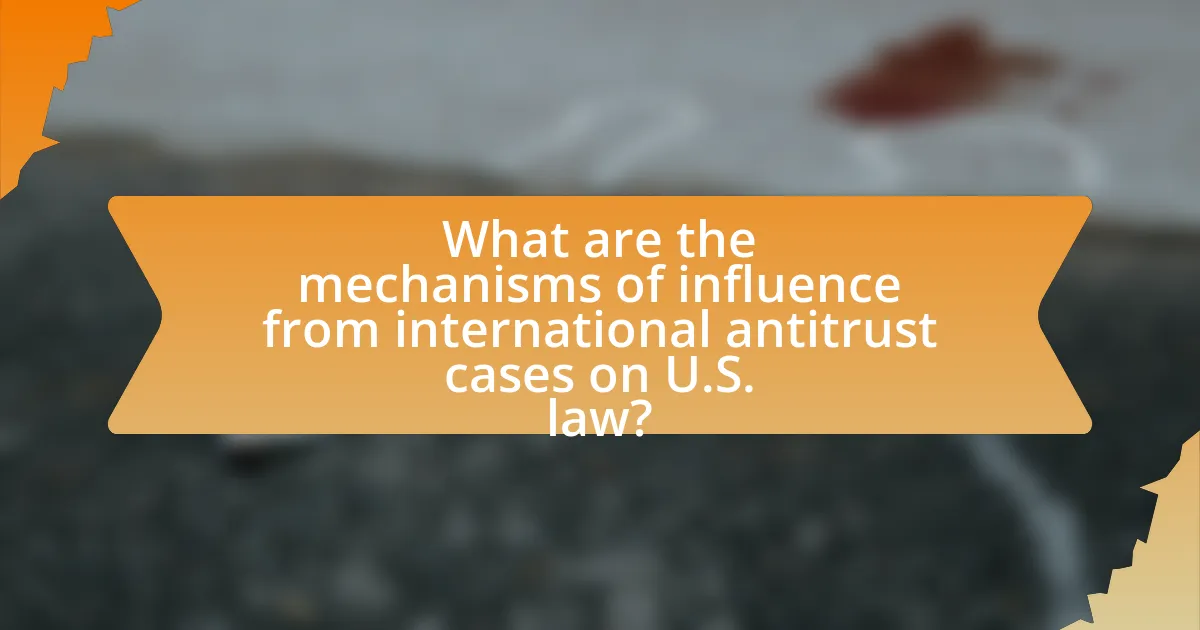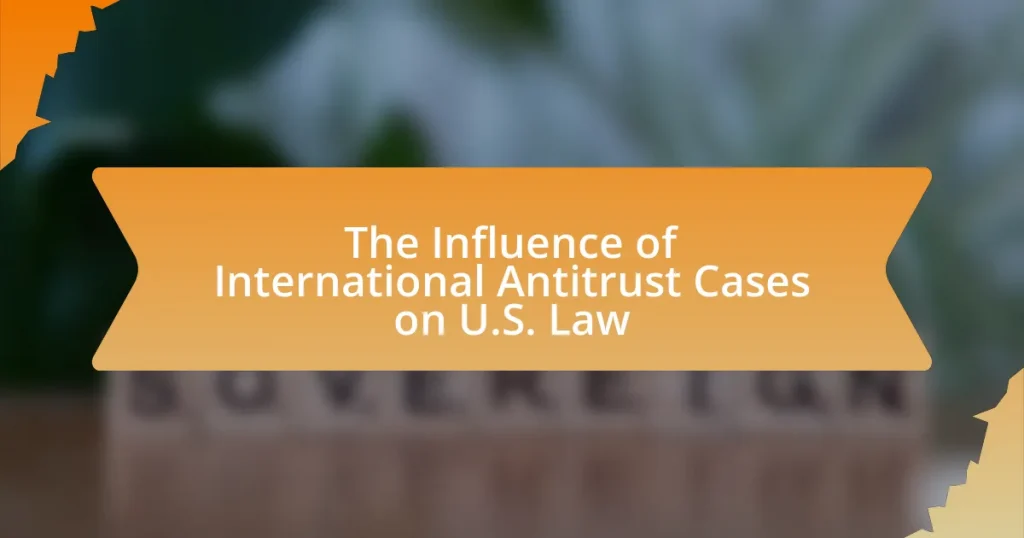The article examines the influence of international antitrust cases on U.S. law, highlighting how global regulatory practices shape domestic enforcement strategies. It discusses the differences between international and U.S. antitrust laws, key principles of international antitrust law, and the historical context that informs these influences. The article also explores the mechanisms through which international rulings impact U.S. legal precedents, the implications for U.S. businesses, and recent trends in international antitrust cases. Additionally, it outlines best practices for U.S. companies to navigate the complexities of compliance with both U.S. and international antitrust regulations.

What is the Influence of International Antitrust Cases on U.S. Law?
International antitrust cases significantly influence U.S. law by shaping regulatory practices and enforcement strategies. For instance, the European Union’s rigorous antitrust actions against major corporations, such as Google and Microsoft, have prompted U.S. regulators to reassess their approaches to competition law. This influence is evident in the adoption of stricter guidelines and increased scrutiny of mergers and acquisitions in the U.S., reflecting a global trend towards more aggressive antitrust enforcement. Additionally, U.S. courts often consider international legal standards and outcomes when adjudicating antitrust cases, which further aligns U.S. law with global practices.
How do international antitrust cases differ from U.S. antitrust laws?
International antitrust cases differ from U.S. antitrust laws primarily in their jurisdictional scope and enforcement mechanisms. While U.S. antitrust laws, such as the Sherman Act and the Clayton Act, focus on maintaining competition within the United States, international antitrust cases often involve multiple jurisdictions and require cooperation among various countries’ regulatory bodies. For instance, the European Union’s antitrust regulations, governed by the Treaty on the Functioning of the European Union, emphasize consumer welfare and market integration across member states, which can lead to different outcomes compared to U.S. cases. Additionally, international cases may involve varying standards of proof and different approaches to remedies, such as fines or structural changes, reflecting the diverse legal frameworks and economic policies of the countries involved.
What are the key principles of international antitrust law?
The key principles of international antitrust law include the promotion of competition, prevention of anti-competitive practices, and the protection of consumer welfare. These principles aim to ensure that markets operate efficiently and fairly, preventing monopolies and cartels that can harm consumers and stifle innovation. For instance, the OECD’s guidelines emphasize the importance of competition laws in fostering economic growth and consumer choice, illustrating the global consensus on these principles.
How do these principles compare to U.S. antitrust regulations?
The principles of international antitrust cases often emphasize a more collaborative and global approach compared to U.S. antitrust regulations, which are primarily focused on protecting competition within the domestic market. International principles may advocate for harmonization of laws and cross-border cooperation, while U.S. regulations, such as the Sherman Act and the Clayton Act, are more stringent in addressing monopolistic practices and mergers that could harm consumer welfare. For instance, the U.S. has a history of aggressive enforcement actions against anti-competitive behavior, as seen in landmark cases like United States v. Microsoft Corp., which aimed to dismantle monopolistic practices. In contrast, international cases may prioritize economic integration and the benefits of competition on a global scale, reflecting different legal philosophies and enforcement priorities.
Why is the influence of international antitrust cases significant for U.S. law?
The influence of international antitrust cases is significant for U.S. law because it shapes the legal framework and enforcement practices within the United States. International antitrust cases often set precedents that U.S. courts and regulators consider when addressing similar issues domestically, leading to a more harmonized approach to competition law. For instance, the European Union’s rigorous enforcement of antitrust regulations has prompted U.S. authorities to reevaluate their own policies and practices, particularly in cases involving multinational corporations. This cross-border interaction enhances the effectiveness of antitrust enforcement and promotes a more competitive global market, ultimately benefiting consumers and businesses alike.
What historical context shapes this influence?
The historical context that shapes the influence of international antitrust cases on U.S. law includes the evolution of global trade and economic policies post-World War II. The establishment of institutions like the International Monetary Fund and the General Agreement on Tariffs and Trade in the mid-20th century created a framework for international economic cooperation, which necessitated the alignment of antitrust laws across borders. Additionally, landmark cases such as the U.S. v. Microsoft Corporation in the late 1990s highlighted the need for a cohesive approach to competition law, influenced by European Union regulations. These developments demonstrate how international legal standards and economic interdependence have progressively shaped U.S. antitrust policy, reflecting a broader trend towards globalization and collaborative regulatory practices.
How have landmark international cases impacted U.S. legal precedents?
Landmark international cases have significantly influenced U.S. legal precedents by shaping antitrust laws and enforcement practices. For instance, the European Union’s Microsoft case established principles regarding market dominance and anti-competitive behavior, which U.S. courts have referenced in similar antitrust litigation, such as the United States v. Microsoft Corp. case. This cross-jurisdictional influence demonstrates how international rulings can inform U.S. legal standards, leading to more rigorous scrutiny of monopolistic practices and fostering a more competitive market environment.

What are the mechanisms of influence from international antitrust cases on U.S. law?
International antitrust cases influence U.S. law primarily through the adoption of legal principles, cross-border enforcement cooperation, and the harmonization of regulatory standards. U.S. courts and regulatory agencies often reference international case law to inform their decisions, leading to a convergence of antitrust practices. For instance, the European Union’s rigorous antitrust enforcement has prompted U.S. regulators to consider similar approaches, particularly in cases involving multinational corporations. Additionally, bilateral and multilateral agreements facilitate collaboration between U.S. and foreign antitrust authorities, enhancing the enforcement of antitrust laws across jurisdictions. This interplay is evident in cases like the Microsoft antitrust litigation, where international scrutiny shaped U.S. legal outcomes.
How do international agreements affect U.S. antitrust enforcement?
International agreements significantly influence U.S. antitrust enforcement by promoting cooperation and harmonization of competition laws among countries. These agreements, such as the OECD Guidelines and the WTO’s Trade Facilitation Agreement, encourage U.S. regulators to align their enforcement practices with international standards, facilitating cross-border investigations and reducing conflicts in legal frameworks. For instance, the U.S. Department of Justice and the Federal Trade Commission often collaborate with foreign antitrust authorities, leading to coordinated actions against anti-competitive practices that span multiple jurisdictions. This collaboration is evidenced by cases like the 2018 Qualcomm antitrust case, where international cooperation was crucial in addressing global market implications.
What role do treaties play in shaping U.S. antitrust policy?
Treaties play a significant role in shaping U.S. antitrust policy by establishing international cooperation and standards for competition law. These agreements facilitate the exchange of information and enforcement actions between countries, which helps to address anti-competitive practices that cross borders. For instance, the U.S. has engaged in treaties such as the U.S.-EU Mutual Legal Assistance Agreement, which enhances collaboration in antitrust investigations. This cooperation is crucial as it allows for a more unified approach to tackling global monopolistic behaviors, thereby influencing domestic antitrust enforcement and policy development.
How do international collaborations influence U.S. regulatory practices?
International collaborations significantly influence U.S. regulatory practices by fostering alignment and harmonization of antitrust laws across borders. These collaborations, such as those facilitated by the International Competition Network (ICN) and the Organisation for Economic Co-operation and Development (OECD), enable U.S. regulators to share best practices and coordinate enforcement actions with foreign counterparts. For instance, the U.S. Department of Justice and the Federal Trade Commission often engage in joint investigations with international agencies, which can lead to more consistent regulatory outcomes and a unified approach to tackling anti-competitive behavior. This collaborative framework has been evident in cases like the Google and Microsoft antitrust investigations, where international cooperation helped shape the regulatory landscape in the U.S. and abroad.
What are the implications of international antitrust rulings for U.S. businesses?
International antitrust rulings significantly impact U.S. businesses by imposing compliance requirements that can alter operational strategies and market behavior. These rulings can lead to increased scrutiny of business practices, necessitating adjustments in pricing, mergers, and acquisitions to align with foreign regulations. For instance, the European Union’s antitrust actions against major tech companies have prompted U.S. firms to modify their data privacy policies and competitive practices to avoid hefty fines and restrictions. Additionally, international rulings can create a precedent that influences U.S. antitrust enforcement, as seen in cases where U.S. regulators adopt similar standards to maintain competitiveness in global markets.
How do these rulings affect competition in the U.S. market?
These rulings can significantly alter competition in the U.S. market by setting precedents that influence domestic antitrust enforcement. For instance, international antitrust cases often introduce new interpretations of competitive practices, which U.S. regulators may adopt to address similar issues domestically. This can lead to stricter regulations on monopolistic behaviors and promote a more competitive environment. Historical examples include the European Union’s actions against major tech companies, which have prompted U.S. lawmakers to consider similar regulatory frameworks, thereby reshaping the competitive landscape in sectors like technology and pharmaceuticals.
What challenges do U.S. companies face due to international antitrust decisions?
U.S. companies face significant challenges due to international antitrust decisions, primarily in the form of increased compliance costs and operational restrictions. These companies must navigate varying antitrust laws across different jurisdictions, which can lead to conflicting legal obligations. For instance, a merger approved in the U.S. may be blocked in the European Union, forcing companies to alter their strategies or abandon deals altogether. Additionally, international antitrust rulings can result in hefty fines and sanctions, as seen in cases like the European Commission’s penalties against Google, which totaled over $9 billion from 2017 to 2019. This creates a complex legal landscape that complicates global business operations and can hinder competitiveness.

What are the recent trends in international antitrust cases affecting U.S. law?
Recent trends in international antitrust cases affecting U.S. law include increased collaboration among global regulatory bodies and a focus on digital markets. Regulatory agencies, such as the European Commission and the U.S. Federal Trade Commission, are aligning their approaches to address anti-competitive practices in technology sectors, as seen in cases involving major tech companies like Google and Facebook. Additionally, there is a growing emphasis on extraterritorial enforcement, where U.S. courts are increasingly considering foreign antitrust rulings, impacting domestic legal frameworks. This trend is evidenced by the U.S. Supreme Court’s decision in the case of “F. Hoffmann-La Roche Ltd. v. Empagran S.A.,” which acknowledged the relevance of foreign antitrust laws in U.S. litigation.
What notable international antitrust cases have emerged recently?
Recent notable international antitrust cases include the European Commission’s decision against Google in 2023 for anti-competitive practices related to its advertising services, resulting in a fine of €1.5 billion. Additionally, the U.S. Federal Trade Commission has been closely monitoring the merger between Microsoft and Activision Blizzard, which has raised concerns about market competition. These cases illustrate the ongoing global scrutiny of major tech companies and their market behaviors, influencing regulatory approaches in the U.S. and beyond.
How have these cases influenced U.S. antitrust enforcement strategies?
International antitrust cases have significantly influenced U.S. antitrust enforcement strategies by prompting a reevaluation of existing laws and practices. For instance, the European Union’s rigorous approach to antitrust, particularly in cases like Microsoft and Google, has led U.S. regulators to adopt more aggressive stances on monopolistic behavior and market dominance. This shift is evident in the increased scrutiny of large tech companies by the U.S. Department of Justice and the Federal Trade Commission, reflecting a desire to align with global standards and address competitive concerns more effectively. Additionally, the outcomes of these international cases have encouraged U.S. lawmakers to consider reforms that enhance regulatory frameworks, aiming to prevent anti-competitive practices and promote fair competition in the marketplace.
What lessons can be learned from recent international rulings?
Recent international rulings highlight the importance of global cooperation in antitrust enforcement. These rulings demonstrate that antitrust authorities across different jurisdictions increasingly align their approaches, which can lead to more effective regulation of multinational corporations. For instance, the European Union’s stringent regulations on tech giants have influenced U.S. lawmakers to consider similar measures, reflecting a trend towards harmonizing antitrust laws. This alignment can enhance the ability to tackle anti-competitive practices that cross borders, as seen in cases involving companies like Google and Apple, where international scrutiny has prompted changes in business practices.
How is U.S. antitrust law evolving in response to international influences?
U.S. antitrust law is evolving to incorporate lessons and frameworks from international antitrust cases, reflecting a growing recognition of global market dynamics. This evolution is evident in the increasing collaboration between U.S. antitrust authorities and their international counterparts, such as the European Commission, particularly in cases involving multinational corporations. For instance, the U.S. Department of Justice and the Federal Trade Commission have begun to align their enforcement strategies with international standards, as seen in the 2021 updates to the Horizontal Merger Guidelines, which now consider competitive effects in a more global context. This shift is further supported by the rise of digital markets, where U.S. regulators are looking to international precedents to address issues like data privacy and market dominance, as highlighted by the European Union’s General Data Protection Regulation.
What changes are being proposed or implemented in U.S. antitrust legislation?
Recent proposals in U.S. antitrust legislation include the introduction of the American Innovation and Choice Online Act and the Competition and Antitrust Law Enforcement Reform Act. These legislative efforts aim to enhance scrutiny of large tech companies, prevent anti-competitive practices, and promote market competition. For instance, the American Innovation and Choice Online Act seeks to prohibit dominant platforms from engaging in self-preferencing, while the Competition and Antitrust Law Enforcement Reform Act aims to strengthen the enforcement capabilities of antitrust agencies. These changes reflect a growing concern over monopolistic behaviors and the need for updated regulatory frameworks to address the complexities of modern markets.
How are U.S. regulators adapting to global antitrust challenges?
U.S. regulators are adapting to global antitrust challenges by increasing collaboration with international counterparts and revising enforcement strategies to address cross-border issues. This adaptation includes participating in global forums such as the International Competition Network and the Organisation for Economic Co-operation and Development, which facilitate the sharing of best practices and harmonization of antitrust policies. Additionally, U.S. agencies like the Federal Trade Commission and the Department of Justice are incorporating lessons learned from international cases, such as the European Union’s approach to digital market regulation, to enhance their own frameworks. This proactive stance is evident in recent policy shifts aimed at addressing the complexities of digital monopolies and ensuring competitive markets in a globalized economy.
What best practices can U.S. businesses adopt in light of international antitrust influences?
U.S. businesses can adopt several best practices in light of international antitrust influences, including conducting thorough compliance assessments, engaging in regular training on global antitrust laws, and implementing robust internal reporting mechanisms. Conducting compliance assessments allows businesses to identify potential risks associated with international operations, as evidenced by the increasing scrutiny from foreign regulators, such as the European Commission, which has imposed significant fines on companies for antitrust violations. Regular training ensures that employees are aware of the complexities of international antitrust laws, which vary significantly across jurisdictions, thereby reducing the likelihood of inadvertent violations. Additionally, establishing internal reporting mechanisms encourages employees to report potential antitrust concerns without fear of retaliation, fostering a culture of compliance. These practices collectively enhance a company’s ability to navigate the complexities of international antitrust regulations effectively.
How can companies ensure compliance with both U.S. and international antitrust laws?
Companies can ensure compliance with both U.S. and international antitrust laws by implementing comprehensive compliance programs that include regular training, legal audits, and consultation with antitrust experts. These programs should be designed to identify and mitigate risks associated with anti-competitive practices, such as price-fixing and market allocation, which are prohibited under both U.S. Sherman Act and various international regulations like the European Union’s Competition Law.
For instance, a study by the American Bar Association highlights that companies with robust compliance frameworks are less likely to face legal challenges, demonstrating the effectiveness of proactive measures in adhering to antitrust laws. Additionally, staying informed about changes in legislation and case law across jurisdictions is crucial, as international antitrust enforcement can influence U.S. practices, exemplified by cases like the EU’s Google antitrust ruling impacting U.S. regulatory approaches.
What strategies can businesses implement to navigate international antitrust complexities?
Businesses can implement several strategies to navigate international antitrust complexities, including conducting thorough market analysis, engaging local legal expertise, and establishing compliance programs. Conducting market analysis allows businesses to understand the competitive landscape and identify potential antitrust risks in different jurisdictions. Engaging local legal expertise ensures that businesses are informed about specific antitrust laws and regulations that vary by country, which is crucial for compliance. Establishing robust compliance programs helps organizations proactively address antitrust issues and mitigate risks associated with international operations. These strategies are supported by the fact that companies with strong compliance frameworks are less likely to face legal challenges, as evidenced by cases where proactive measures led to reduced penalties in antitrust investigations.



